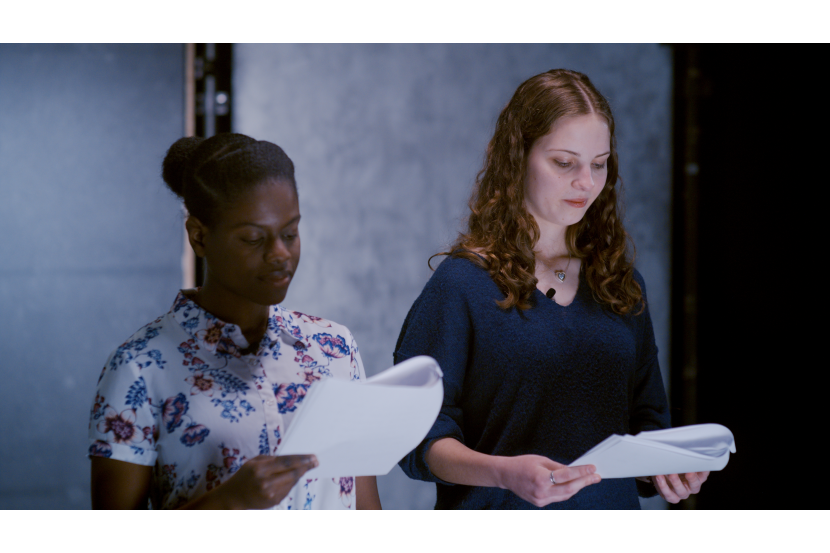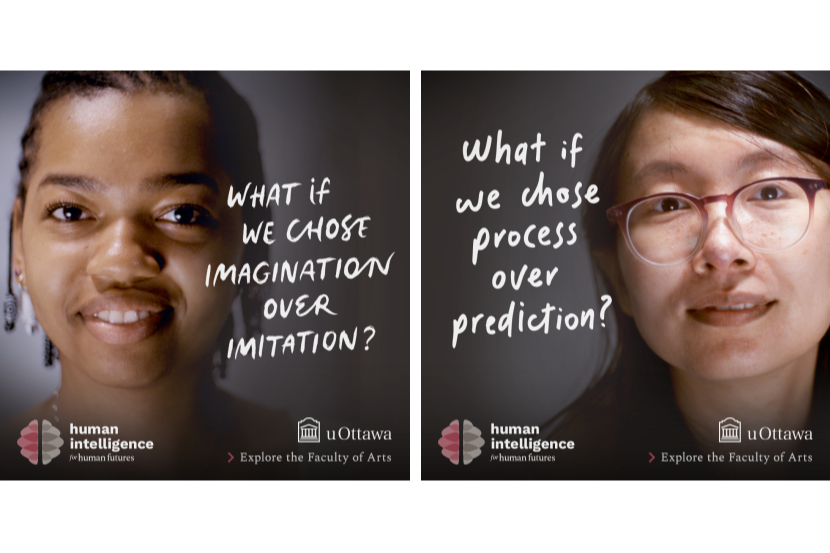How do you communicate the value of a liberal arts education in an era that feels increasingly dominated by artificial intelligence and technical specialization? When we invited students to confront pre-written narratives about their futures, we were not simply marketing our courses and programs; we were exploring what it means to reclaim agency.
“Human Intelligence for Human Futures” captures the essence of what a liberal arts education cultivates: agency, creativity, critical reasoning, empathy, curiosity, and more. This positioning, developed with the team at Fractal Communications, led directly to our “Futures Foretold” campaign, which intentionally juxtaposes the human skills fostered by a liberal arts education against the deterministic visions of a world that feels increasingly directed by algorithms.
Algorithms and Agency
At the heart of “Futures Foretold” is a commitment to ensuring that technology serves humanity, not vice-versa. We recognize that we increasingly rely on algorithms, the building blocks of computing, to manage and optimize our daily lives. From music playlists and movie recommendations to financial decisions, romantic encounters, diet plans, and social interactions, our lives are now significantly mediated through predictive technologies. I’m there too – each morning I check my Whoop to check my “Sleep,” “Strain” and “Recovery.”
Algorithms operate solely by correlation. They predict our future preferences based exclusively on past data. And as my colleague Bethany Nowviskie outlined in a brilliant chapter in Pastplay: Teaching and Learning History with Technology (my edited collection published by the University of Michigan Press in 2014), they are formulated out of interpretive decisions by the people (or agents) that create them.
When algorithms are the property of private corporations, we cannot see them at work. And if simply received, and used, these algorithms leave less room for creativity, spontaneity, intuition, or imagination. Over time, this dependency can erode our autonomy, subtly shaping us into passive recipients rather than active participants in our own lives. In Pastplay we gave voice to our concern that so-called “digital natives” who were born and raised with technology (in contrast to “digital immigrants” like me who adopted digital technologies later in life) were at risk of becoming “digital consumers” who consumed digital content rather than producing, analyzing or understanding it critically.
Lost Futures and Perpetual Presentism
Equally concerning is the widespread cultural phenomenon some philosophers call presentism: the pervasive absence of hopeful and clearly articulated visions of the future. This absence can limit us to a perpetual state of present-day optimization. We constantly refine and perfect our lives without asking the critical question: what are we optimizing for? Without the capacity to envision a meaningfully better future, optimization risks becoming a hollow exercise: perfection without purpose. If we lose the ability to articulate or even imagine positive futures, how can we ever build them? If algorithms predetermine our paths, what becomes of our human ability to dream, innovate, and create?
Inside the Black Box: The Experiment
To explore these critical questions experientially, we put out a call to University of Ottawa students to come to our black box theatre (which I had the privilege to build and open as Dean in 2018, thanks to the work of my colleagues in the Department of Theatre and across the university) and speak, on camera, to a series of statements about the future. We were overwhelmed when over a thousand students responded. In the end, twenty-five students, undergraduate, graduate, and lifelong learners, entered a minimalistic, stark environment. They were handed scripts that contained short, provocative statements written as first-person predictions of their futures. The statements sought to explore themes relating to algorithmic determinism, such as:
- “My best friend will be a chatbot.”
- “I will not know if my therapist is a deepfake or a real human, but I won’t care because they are really effective.”
- “My favorite band will be a bot that makes music just for me.”
- “My nutrition, my routine, my workday and even my social life will be perfectly optimized by artificial intelligence.”
- “I will require a monthly subscription for my pants.”
As students read these statements aloud, their unscripted emotional responses (surprise, skepticism, discomfort, resistance) were recorded as the cameras rolled.

Human Intelligence Emerges
Initially, students approached their scripts cautiously, with varying degrees of hesitancy. But as they continued, their responses became increasingly authentic and powerful. They spontaneously rejected passive acceptance, actively pushing back against deterministic narratives that suggested they lacked control over their futures. They frequently insisted on the importance of choice, creativity, and human connection as essential to their identity and purpose.
They knew that critical reflection, empathy, and creativity are necessary to reclaim and rewrite their futures. The emotional and cognitive depth we saw on display was powerful proof of what human intelligence looks like in action.

Perhaps the most inspiring outcome from the “Futures Foretold” experience was this reaffirmation of the enduring strength and importance of human intelligence. Despite overwhelming cultural narratives of algorithmic inevitability and diminished expectations for the future, students consistently displayed hope and determination. They did not simply accept algorithmically-generated visions as inevitable truths; instead, they became active agents, capable of imagining alternatives and improvements to their futures.
Liberal Arts Education: Reclaiming the Future
Through this experiential campaign, we have begun to articulate why a liberal arts education is not just relevant, but indispensable in 2025. A Faculty of Arts education deliberately cultivates the precise human skills (imagination, critical thinking, empathy) that algorithms alone cannot replicate. As we navigate an increasingly complex technological landscape, these capacities represent our greatest and most enduring assets.
The Human Intelligence campaign is the beginning of a broader conversation. How do we want technology to shape our career and our lives, and how can we ensure humanity remains central? At the University of Ottawa’s Faculty of Arts, we are deeply committed to exploring these questions. We invite you to join us in this important dialogue.
Let’s choose to write better futures.
